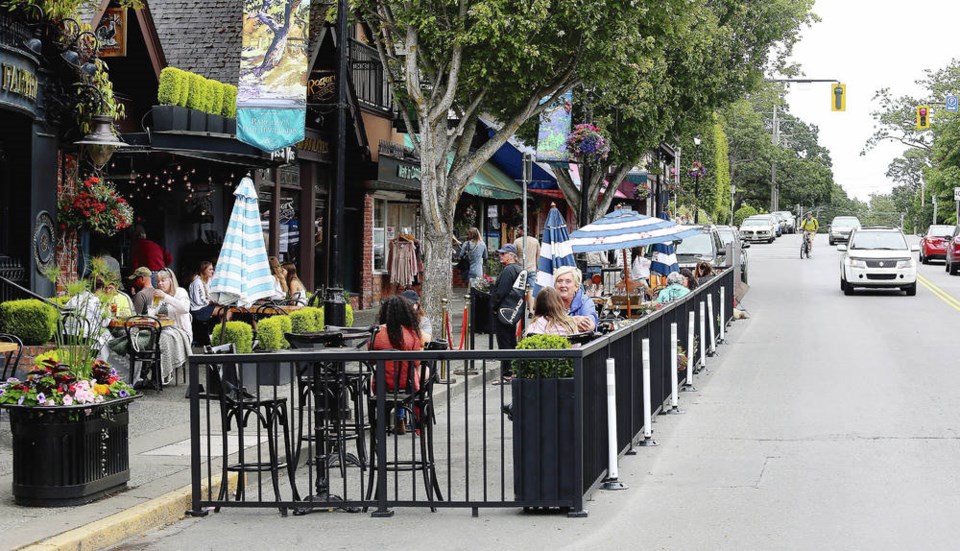B.C.’s health minister says while no decision has been made, it “wouldn’t be a surprise” if a ban on indoor dining continues beyond Monday’s deadline, amid rising COVID-19 case counts and increasing hospitalizations.
Health Minister Adrian Dix said provincial health officer Dr. Bonnie Henry and her team had a “frank” discussion with restaurant industry representatives on Tuesday, where she said that “case counts are too high, that hospitalizations are growing, and in her view that steps would continue to be required.”
The B.C. Restaurant and Food Services Association told its members Tuesday that it has been informed a ban on indoor dining at restaurants will be extended beyond April 19, when the current order was set to expire.
Dix said Wednesday the prospect of an extended order “wasn’t a surprise to the restaurant association, and was part of their discussions yesterday that the situation remains very serious.”
Mike Murphy, who owns the 10 Acres Farm & Restaurant Group, which includes Commons, Pier and Cafe, anticipates restrictions will be in place until after the May 24 long weekend, but notes that “if the weather’s nice, it’s not the end of the world.”
“The weather is going to be the main thing and we’re not going to be able to count on that.”
Rob Chyzowski, who owns Belleville’s Watering Hole and Diner in James Bay, said with 140 patio seats, heaters, large umbrellas and loyal patrons, he’s expecting to fare well despite the anticipated extension of restrictions.
Business is “fantastic,” said Chyzowski, noting the restaurant hired 12 people this week.
He credits government grants that he’s reinvested in things such as patio furnishing for helping his business to thrive.
On March 29, the provincial health officer imposed new restrictions until April 19, ending indoor dining and drinking at restaurants, pubs and bars, cancelling indoor group exercise classes, suspending indoor faith gatherings, and closing Whistler ski resort, where there was a high rate of COVID-19 transmission. Workplaces were advised that if they experienced a COVID exposure, they may be ordered to close for a minimum of 10 days.
The expanded restrictions have produced positive effects, said Dix, “but we need to keep doubling down on ensuring physical distancing, because this is a virus that transmits through social interaction, and all of us have to do what we can to limit social interactions.”
Another 1,168 cases of COVID-19, including 64 in Island Health, were reported on Wednesday.
There are 9,821 active cases in the province, including 397 in hospital. Of those, 120 are in intensive care — the second-highest daily count for people in critical-care beds.
Just over 16,300 people are being monitored for the virus in B.C. because of contact with an infected person. There have been another six COVID-19 related deaths in B.C., for a total of 1,521.
Almost 1.2 million people in B.C. have received their first dose of the AstraZeneca, Pfizer-BioNTech or Moderna vaccine, said Dix.
Of those, just over 104,000 have received a first dose of AstraZeneca, available in 610 B.C. pharmacies to people ages 55 to 65.
Henry, who is scheduled to present new COVID-19 modelling data today, said that people who use the pharmacy option will speed up the pace of the age-based program. People have been prioritized by age for the vaccine because more serious illness and death from COVID-19 generally occur in people who are older.
Health Canada said Wednesday there is enough evidence to show the Oxford-AstraZeneca vaccine may cause rare blood clots, but it considers the benefits of the vaccine in preventing serious COVID-19-related illness to outweigh the risk of blood clots and is not limiting its use for any age group or gender.
The National Advisory Committee on Immunization, which recommended March 29 that AstraZeneca not be used on patients under 55, will meet to decide if its advice should be updated. NACI issued a statement Wednesday saying it will update the guidance soon.
Dix said the province expects to receive guidance from NACI over the next week, but for now, “it’s full steam ahead using the AstraZeneca we have.”
The province’s original plan was to use AstraZeneca to vaccinate essential workers, including first responders, teachers, childcare workers and grocery store staff. First responders, teachers and childcare workers are now receiving the Pfizer and Moderna vaccines, while other essential workers are awaiting their shots.
While people are at reduced risk once they are vaccinated and immunity has built up over three weeks, they need to continue to follow provincial health orders and guidance related to mandatory masks indoors, physical distancing, and restrictions on gathering indoors, Dix said.
“It makes you safer being vaccinated,” he said. “But right now, the rules apply to everybody.”
A total of 4.3 million B.C. residents are eligible to be vaccinated, and B.C. hopes to provide a vaccine to everyone who wants it by July 1.
ceharnett@timescolonist.com



